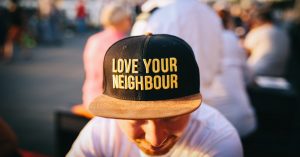Here is Part 1, Part 2, and Part 3 of this series.
I said this in part 3: “I have friends who are gay. (I know immediately I’m stepping on a landmine here, so if I’ve written something wrong in that sentence, my apologies.) Without debating the rightness or wrongness of that, I have to confess that it is easier for me to make friends with people who I meet as gay or lesbian than it is for me to not judge someone who I know as straight and then changes during the time I know them.”
I don’t think I’m alone here. We struggle with perceiving change in people who we know to be one way, and then transform into something else. This includes physical appearance, issues of sexuality, spiritual background, and even when someone “starts attending a different church.”
The reason I bring this up here in this series is because of why it actually happens. Why do I have difficulty with people changing while I know them when I don’t have difficulty meeting and engaging someone who is already like that when I met them? As I think about it, the answer is disturbingly simple, and I regret even bringing it up, because it shows a hole in the Christian cultures we have created.
Let me start with this story. I’ve been working on my autobiography over the last few years. I plan to release it when I turn 50. As I wrote, I began with my time in Fremont, Ohio and thought about the community built at Fremont Baptist Temple. My dad was the pastor and he is a master builder of community. The communities that were created there in Northwest Ohio were among the best communities of people I’ve ever experienced even to this day. But I thought of something as I’ve been writing that Facebook helped me to process: Even though it was a great community of people, the amount of people who ‘disappeared’ during that time is shocking. They were a part of that community, and then they were not. Until Facebook really became mainstream, I never really thought about some of those people again.
It’s not they they were kicked out of the church (In most cases), and in many cases, they didn’t leave the church as a whole. They just went to other churches and decided to ‘switch communities’. And of course, others left church all together.
Prior to the turn of the century, it was easy to ignore someone who changed and became something different. Social media has turned that opportunity on its head. We can no longer ignore divisions among us, in church or outside of church. We can choose to unfollow or unfriend but others have that same information, so key differences shine bright in front of us now, instead of going the way of ignorance.
I bring this up because its important how we deal with differences now, especially if you want to be seen as a person of character. We can no longer just shove someone out of our communities if they differ with the pastor or if they become transgender or if they decide to walk away from their faith or the faith of the church.
So why do I struggle when someone in my circle changes in some way, including someone who is deconstructing? Because inside, I look it it as an affront to me and the things I believe and the culture I’ve chosen. I don’t view someone who was never in my culture as someone who has chosen something else even though they have chosen something else because it’s not about me in that case. When someone leaves my church or if someone I know turns gay when before they weren’t or if someone chooses to deconstruct their faith, when before they believed what I believe, they have essentially decided that the life I have chosen is not good enough for them.
The reason this happens (especially with pastors and including Christians) is because many of our relationships have become transactional. We hang out with people who transact with us instead of with people who we love and care for. If they go to our church and if they give and if they believe a certain thing, then we spend time with them and they are worthy of our time. We pour into those who can do something for us, and therefore have a plethora of transactional relationships only.
The same thing is not true, however, when we start talking about people who are not naturally a part of our present cultures. We think of them as people that can possibly come into our cultures though. We think of them of them as people who can eventually become a part of our church or our inner circle or who can volunteer in places where we have need. We think of them as someone who can be evangelized.
So what can we do about this? Alas, it is scary at how most of our American relationships even outside of the church are transactional. It is almost a part of who we are and probably has something to do with the long voyage the Europeans used to get here, and then their need to rely on others (thus the transactional part) as they populated the mainland of the United States. So it’s not just a church thing, but transactional is exactly what are relationships are not supposed to be in the church.
So I arrive back at the gospel.
“The gospel is the royal announcement that the crucified and risen Jesus, who died for our sins and rose again according to the scriptures has been enthroned as the true Lord of the world. So as a result of this, we are called to salvation, out of sheer grace, leading us to repentance and faith in Jesus Christ as the risen Lord.“
That is not transactional. He died for our sins and rose again according to the Scriptures. We are called to salvation and choose by his grace to be led to repentance and faith in Jesus. He chose to do this even though Judas betrayed him and Peter denied him and most of his followers fled like ants after my 5 year old steps on the hill. He chose to do this even though many Christians routinely fall back into repeated sin. He chose to do this even though you and I mess up royally! That is not transactional.
And yet pastors (including this one) get pissed when someone chooses to go to another body of believers.
Or parents push away their children who choose a different lifestyle than they had foreseen for their aspiring geniuses.
Or church members walk away from other friend believers who start to deconstruct their faith (or even spiritually minimalize in some cases, because they are “not who they used to be.”

Some years ago, a lady told me a story I’m going to do my best to recall. She told me after a few years in her marriage, that she started drinking and rebelling. She was brought up in a very fundamentalist environment and because of some struggles with mental illness, she had moments of extreme lashing out in terms of drinking and fighting with her pastor husband of 5-7 years. She started going to local bars and staying away from church for months at a time. Her husband obviously had trouble with this, but there wasn’t much he could do. Over time, she met this guy at a bar and they started talking and eventually had an affair of sorts. The man worked in one state and lived in another state 1000 miles away. He went home, and soon, she followed him there, much to the dismay of the pastor with small kids at home.
Shortly into her stay with the man 1000 miles away, the woman’s mental illness started acting up. She went berserk (my words, not hers) and the man from 1000 miles away didn’t know what to do. He reluctantly called her husband and told him to come get her. She needed help. So the pastor husband, straight out of the Old Testament story of Hosea, obtained childcare, and drove 1000 miles to the place his wife stayed. He walked into the house of the man who slept with his wife, he picked her up off the couch where she lay sullen and meek and crying, and he took her home.
This is the kind of love we as Christians are called to give to people, both who we like and who hurt us. It is a distinct mark of someone who believes the gospel (good news of Jesus) and lives it out. It is not easy, and I by no means am perfect when it comes to this. Even now, I’m struggling with some real bitterness I have about a disgruntled neighbor, who I paint as a jerk and a psycho.
But using the power you have (or even your own self confidence) for more power or to get even is the exact opposite thing we should be doing to usher in the Kingdom of God. We don’t use our power for more of our own strength. We use our weakness for His strength, and it is then that we can recreate the world around us and stop it from going the way of ‘survival of the fittest’. If you hate the teaching of evolution, don’t give in to it’s most base value by stomping out your enemies. Create the world Jesus showed us we could create by loving your enemies and those who change right in front of you, even if it makes you uncomfortable at times.
There is no better way than to love your enemies. Jesus taught it, and then lived it out by dying at the hands of those who hated him most. Imagine what would happen if we chose to love those who we disagreed with first.




